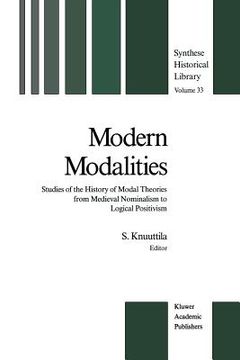Compartir
Modern Modalities: Studies of the History of Modal Theories from Medieval Nominalism to Logical Positivism
Knuuttila, Simo (Autor)
·
Springer
· Tapa Blanda
Modern Modalities: Studies of the History of Modal Theories from Medieval Nominalism to Logical Positivism - Knuuttila, Simo
Sin Stock
Te enviaremos un correo cuando el libro vuelva a estar disponible
Reseña del libro "Modern Modalities: Studies of the History of Modal Theories from Medieval Nominalism to Logical Positivism"
The word "modem" in the title of this book refers primarily to post-medieval discussions, but it also hints at those medieval mo- dal theories which were considered modem in contradistinction to ancient conceptions and which in different ways influenced philosophical discussions during the early modem period. The me- dieval developments are investigated in the opening paper, 'The Foundations of Modality and Conceivability in Descartes and His Predecessors', by Lilli Alanen and Simo Knuuttila. Boethius's works from the early sixth century belonged to the sources from which early medieval thinkers obtained their knowledge of ancient thought. They offered extensive discus- sions of traditional modal conceptions the basic forms of which were: (1) the paradigm of possibility as a potency striving to realize itself; (2) the "statistical" interpretation of modal no- tions where necessity means actuality in all relevant cases or omnitemporal actuality, possibility means actuality in some rel- evant cases or sometimes, and impossibility means omnitemporal non-actuality; and (3) the "logical" definition of possibility as something which, being assumed, results in nothing contradic- tory. Boethius accepted the Aristotelian view according to which total possibilities in the first sense must prove their met- tle through actualization and possibilities in the third sense are assumed to be realized in our actual history. On these presump- tions, all of the above-mentioned ancient paradigms imply the Principle of Plenitude according to which no genuine possibility remains unrealized.
- 0% (0)
- 0% (0)
- 0% (0)
- 0% (0)
- 0% (0)
Todos los libros de nuestro catálogo son Originales.
El libro está escrito en Inglés.
La encuadernación de esta edición es Tapa Blanda.
✓ Producto agregado correctamente al carro, Ir a Pagar.

